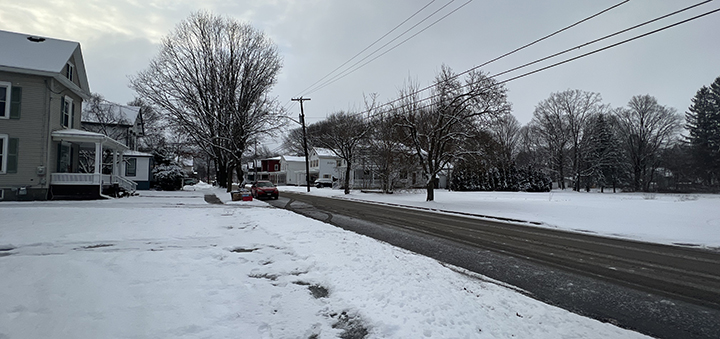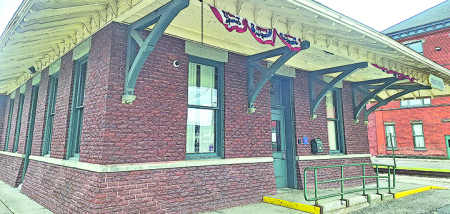NPD Offers Tips To Stay Safe During Winter Weather
Published:
January 17th, 2024
By:
Sarah Genter
 The City of Norwich Police Department and the Center for Disease Control have several tips to stay safe on the roads, at home, and outdoors during the winter months. (Photo by Sarah Genter)
The City of Norwich Police Department and the Center for Disease Control have several tips to stay safe on the roads, at home, and outdoors during the winter months. (Photo by Sarah Genter)
CHENANGO COUNTY — After heavy snowfall Tuesday, the City of Norwich Police Department (NPD) has offered tips for Chenango County residents to stay safe during the winter months.
Snowfall and ice can cause hazardous conditions when driving. NPD Deputy Chief Scott Burlison said there are several things motorists can do to drive safely on snowy roads.
"Motorists should make sure their vehicle is in good condition, the fuel tank is full, [with a] good set of snow tires. Motorists should increase their following distance from three to four seconds to five to six seconds because it takes longer to slow down and stop on snow-covered roads," he said. "Avoid using cruise control and any auto-driving features that could interfere with you maintaining control of your vehicle."
Additionally, he said drivers should keep extra hats and gloves, emergency blankets, bottled water, flashlights with extra batteries, and a first aid kit in their cars in the event of an emergency while out on the road.
Snowplows are a common sight on the roads after snowfall. Burlison said motorists should keep their distance from the plow and make sure they can be seen by the operator.
"Motorists should turn their lights on to see and be seen. Never drive through the snow cloud coming off the plow. Reduce your speed and keep a safe distance back from the plow; there are many blind spots," he explained. "When you see a plow coming toward you, move as far away from them as possible so as not to crowd the snowplow."
While these precautions can keep drivers safe in winter weather, ultimately Burlison said to stay off the roads unless travel is necessary, and don't park vehicles in the street so snowplows can clear the roads of snow both faster and safer.
In addition to safety precautions while driving, there are also things area residents can do to be prepared in the event severe winter weather causes power outages or road closures.
Burlison suggested keeping flashlights and extra batteries as well as non-perishable food and water in the home. If a storm is coming, he said residents should also make sure all mobile phones are fully charged, and any residents who take medication should ensure they have enough to last through the storm.
The winter season also brings along colder temperatures, which can pose health and safety risks. The Center for Disease Control (CDC) recommends wearing layers when going outside, including an inner layer, an insulation layer, and an outer layer. They also encourage the use of hats, a scarf or knit mask to cover the face, water-resistant coats and boots, and mittens, which are warmer than gloves.
The CDC also warns individuals to stay dry while outdoors in the cold, remove extra layers when feeling warm to prevent sweating, and avoid getting gasoline or alcohol on the skin when de-icing or fueling a car or snow blower, which can all cause the body to lose more heat.
Additionally, they say to be aware of shivering, which is the first sign of a body losing heat, and signals it's time to head back indoors.
Staying outdoors in the cold for too long can cause hypothermia and frostbite. Warning signs of hypothermia, or an abnormally low body temperature, include shivering, exhaustion, fumbling hands, memory loss, confusion, slurred speech, and drowsiness.
They recommend checking an individual's temperature - temperatures below 95 degrees signal an emergency, and affected individuals should seek medical attention immediately.
Signs of frostbite include loss of feeling and color in the affected areas, which are usually the nose, ears, cheeks, chin, fingers, and toes, according to the CDC. Frostbite can also cause a white or gray-yellow skin area, as well as skin that feels unusually firm.
Individuals showing signs of frostbite should seek medical care right away. If left untreated, the CDC said frostbite can cause permanent damage to the body, and in severe cases may lead to amputation of affected body parts.
More information on winter weather safety can be found at www.cdc.gov/nceh/features/winterweather/index.html.
Author: Sarah Genter - More From This Author
Comments










